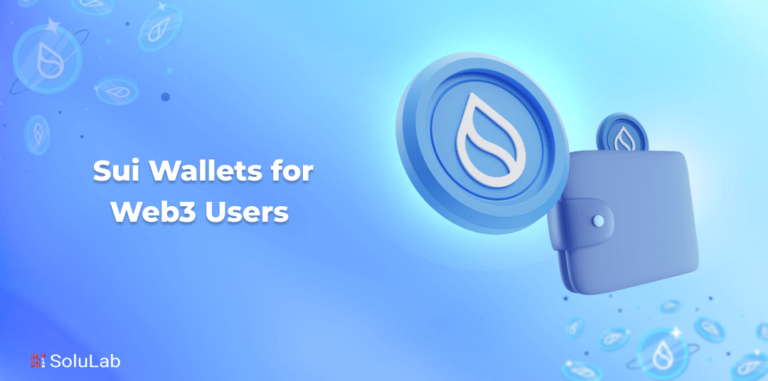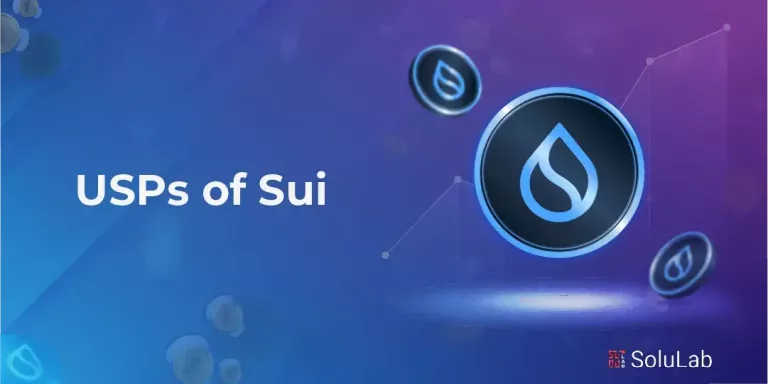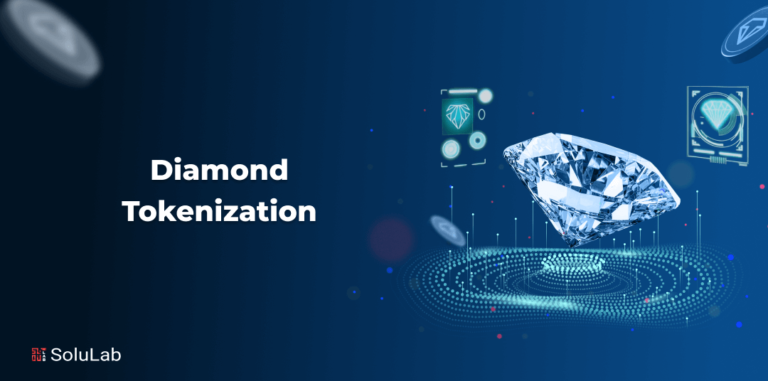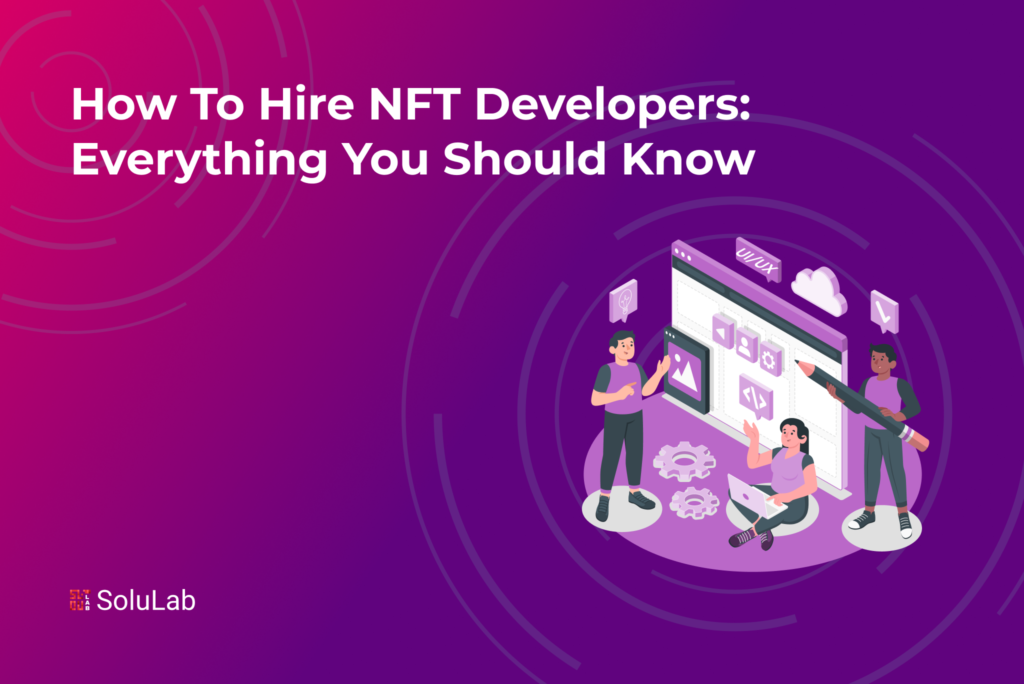
In the realm of digital assets, Non-Fungible Tokens (NFTs) have become a transformational force. Both individuals and industries have been enthralled by their distinct qualities and rising appeal. The importance of skilled NFT developers cannot be emphasized since they have the technical know-how and industry expertise required to implement NFT projects successfully.
In order to address the growing need for knowledge in this area, NFT development businesses have developed. NFT development encompasses a number of essential components, from blockchain integration to the construction of smart contracts.
NFTs & Their Growing Popularity
Non-Fungible Tokens, or NFTs, stand for digital assets that have distinctive qualities that separate them apart from other tokens like bitcoins. Because each NFT is unique, it cannot be traded one-to-one and is thus indivisible. Blockchain technology ensures proven ownership and scarcity, therefore guaranteeing its uniqueness.
NFTs have become incredibly popular in recent years. A booming market for these digital assets has emerged as a result of the growth in NFT sales. The conversion of famous pieces of art, musical CDs, sports collectibles, and digital real estate into NFTs has garnered a lot of media interest. The hype around NFTs has been heightened by eye-catching sales numbers, such as the renowned Beeple artwork selling for $69.3 million.
Read Our Blog: Things you need to know about NFT Marketplace
Statistical findings support the rising acceptance of NFTs. The amount of NFT sales have significantly increased, which reflects the rising demand for these distinctive digital assets. The market capitalization for NFTs has also seen a striking increase, reflecting the growing importance of this emerging business.
Further evidence of the increasing popularity and involvement of NFTs throughout the world can be seen in the rise in the number of active NFT wallets and users. NFTs have been used by a variety of industries, including art, gaming, and collectibles, which has sparked innovation and creativity in each of these fields. Further highlighting the worldwide scope of this phenomenon is the regional dispersion of NFT buyers and sellers.
The Role of NFT Developers and Their Significance
NFT developers play a vital role in the creation and success of NFT projects. They possess the technical expertise required for blockchain and smart contract development, enabling them to bring NFT concepts to life. NFT developers understand the intricacies of NFT standards such as ERC-721 and ERC-1155, ensuring seamless integration and compatibility with various blockchain platforms.
Their knowledge extends beyond technical proficiency; NFT developers are well-versed in integrating NFTs with wallets and marketplaces. This enables NFT owners to securely store and trade their digital assets, while also facilitating a smooth user experience. NFT developers also contribute to the growth and evolution of the NFT ecosystem by developing unique and innovative features that enhance the value and utility of NFTs.
Understanding NFT Development
NFT development encompasses several crucial aspects. Creation of NFTs involves selecting the appropriate blockchain platform, such as Ethereum or Binance Smart Chain, and writing and deploying smart contracts that define the properties and characteristics of the NFTs. This process is followed by minting and issuing NFTs with associated metadata, providing additional information and context to the digital assets.
Integration with blockchain networks is another crucial aspect of NFT development. NFT developers interact with blockchain APIs and infrastructure, ensuring efficient transaction handling and secure storage of NFT data. Compliance with blockchain protocols is of paramount importance to maintain the integrity and immutability of NFTs.
NFT development companies have emerged to cater to the growing demand for NFT expertise. These companies specialize in providing comprehensive NFT development services, ranging from smart contract creation to marketplace integration. They possess a deep understanding of the NFT ecosystem, enabling them to assist clients in bringing their NFT projects to fruition.
How to Hire NFT Developers: All the Information You Need
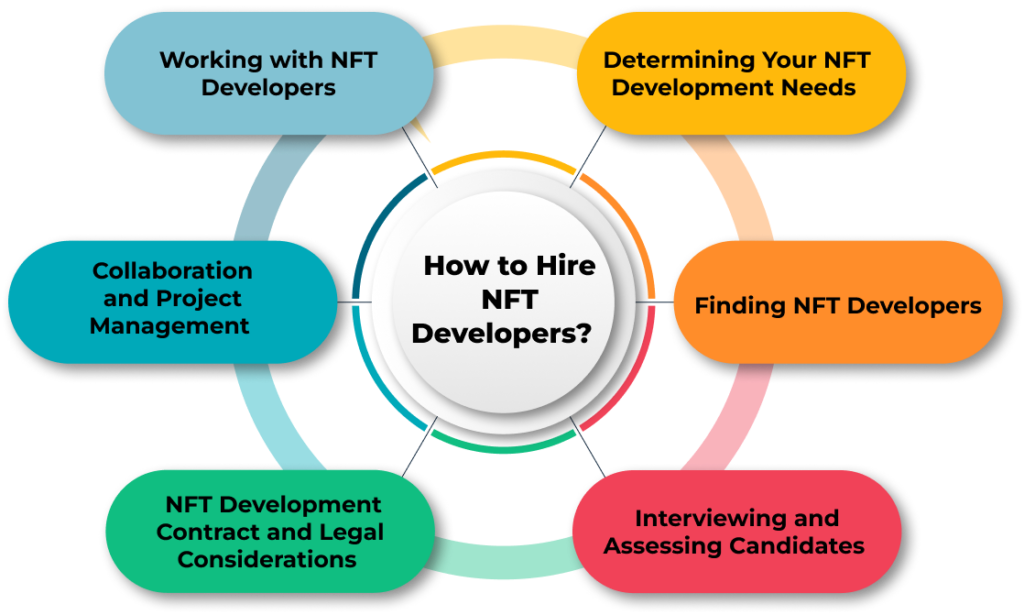
As the NFT ecosystem continues to evolve, the contributions of NFT developers will shape the future of this exciting digital frontier. The following steps will guide you through the process of hiring nft developers.
Step 1: Determining Your NFT Development Needs
To start the hiring process, it’s crucial to define your NFT development needs. Clearly articulate your project goals, objectives, and the specific features and functionalities you require. This will help you identify the type of NFT developers you need and set realistic expectations in terms of project timeline and budget.
Step 2: Finding NFT Developers
There are several options for finding and hiring skilled NFT developers:
- In-house Developers: Hiring full-time NFT developers as part of your team can provide better control and collaboration. You can advertise job openings on relevant platforms, attend blockchain conferences, and leverage professional networks to find suitable candidates.
- Freelancers: Freelance NFT developers offer flexibility and cost-effectiveness. Platforms like Upwork, Freelancer, and specialized blockchain job boards can help you find experienced freelancers with NFT development skills.
- Development Agencies: NFT development agencies specialize in providing end-to-end NFT development services. They have a team of experts who can handle various aspects of your project. Research and reach out to reputable agencies that align with your project requirements.
Essential Factors to Consider
When evaluating NFT developer candidates, consider the following factors:
- Skillset and Expertise: Assess their technical skills, experience with blockchain development, and proficiency in NFT standards and protocols.
- Portfolio and Previous Experience: Review their portfolio and previous NFT development projects. Look for relevant experience that aligns with your project requirements.
- Knowledge of Blockchain Platforms and Protocols: Ensure that they are familiar with the blockchain platform you plan to use and have experience working with its protocols.
- Familiarity with NFT Standards: Verify their understanding of NFT standards such as ERC-721 and ERC-1155, as adherence to these standards is crucial for seamless integration and interoperability.
- Ability to Integrate with Wallets and Marketplaces: Assess their capability to integrate NFTs with popular wallets and marketplaces, enabling easy buying, selling, and management of NFTs.
Step 3: Interviewing and Assessing Candidates
During the hiring process, conduct thorough interviews and assessments to evaluate candidates effectively:
- Prepare Relevant Interview Questions: Ask about their experience with NFT development, their problem-solving abilities, and how they approach technical challenges specific to NFTs.
- Conduct Technical Assessments and Code Reviews: Request code samples or assign small coding tasks to assess their technical proficiency and the quality of their work.
- Evaluate Communication Skills and Cultural Fit: Effective communication and collaboration are crucial for a successful partnership. Assess their ability to communicate complex technical concepts and their compatibility with your team and project culture.
Step 4: NFT Development Contract and Legal Considerations
Once you have selected a candidate or a team of NFT developers, it is essential to establish a comprehensive contract that outlines the scope of work, deliverables, timelines, and payment terms. Consider legal aspects such as intellectual property rights, ownership of the developed code, and any compliance requirements related to the NFT project.
Check Out Our PR Article: SoluLab Bridging the Gap Between Technology And Innovation
Step 5: Collaboration and Project Management
Establishing effective collaboration and project management processes is vital for successful NFT development:
- Communication Channels: Set up clear communication channels, such as regular meetings, chat platforms, and project management tools, to ensure seamless interaction and updates.
- Project Milestones and Deliverables: Define clear milestones and deliverables to track progress and ensure the timely completion of the project.
- Regular Updates and Feedback Cycles: Maintain regular progress updates and feedback cycles to address any issues promptly and keep the project on track.
Step 6: Working with NFT Developers
To foster a productive relationship with NFT developers:
- Provide Appropriate Documentation and Resources: Provide pertinent project documents, design assets, and any other resources needed for efficient development.
- Encourage Collaboration and Knowledge Sharing: Create an atmosphere where your team and the developers can work together, share their experiences, and come up with original solutions to problems.
- Resolve Challenges and Conflicts: Resolve any challenges or conflicts that may arise promptly and constructively, helping to promote an encouraging and fruitful work environment.
Read Our Blog Post: How to Build an NFT Marketplace on Ethereum Blockchain?
Best Practices for Successful NFT Development
For effective NFT development, take into account the following recommendations:
- Implement stringent testing and quality assurance procedures to guarantee the reliability and functionality of the created NFTs.
- Adopt agile methodologies and iterative development approaches, which promote flexibility, regular feedback, and continuous improvement throughout the development process.
- To guarantee that your project remains relevant and competitive, keep up with the most recent innovations, trends, and developments in the NFT field.
NFT Developer Resources and Community
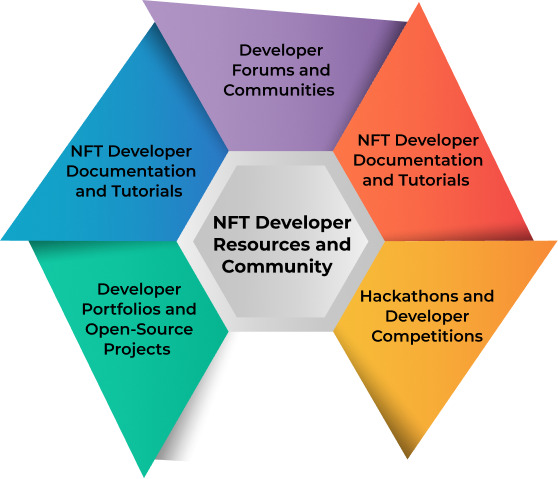
Collaboration, information exchange, and a welcoming developer community are essential for the world of NFT development to prosper. It’s crucial to utilize the resources at your disposal and interact with the larger community when you start the process of hiring NFT developers. The importance of the NFT developer community is examined in this part, along with helpful resources for both developers and those wishing to employ them.
- Developer Forums and Communities: Online forums and communities dedicated to NFT development provide a platform for developers to connect, share insights, and seek guidance. Platforms like Discord, Telegram, and specialized NFT developer forums host discussions, and Q&A sessions, and offer opportunities for networking. Engaging with these communities can help you identify talented developers, gain insights into best practices, and stay updated with the latest trends in NFT development.
- NFT Developer Documentation and Tutorials: Blockchain platforms and NFT standards often provide extensive documentation and tutorials to assist developers in understanding the technical aspects of NFT development. Resources such as the Ethereum Developer Documentation and tutorials on platforms like OpenSea and Rarible offer valuable insights into NFT contract creation, metadata handling, and integration with wallets and marketplaces. Encourage your hired NFT developers to leverage these resources to enhance their knowledge and expertise.
Read Our Blog: How To Launch Your Own NFT Marketplace Website in Less Than 2 Days?
- Hackathons and Developer Competitions: Participating in NFT-focused hackathons and developer competitions can be an excellent way to discover talented developers and showcase their skills. These events provide an opportunity for developers to collaborate, build innovative NFT projects, and gain recognition in the NFT developer community. Keeping an eye on upcoming hackathons and competitions can help you identify developers who have proven their abilities and passion for NFT development.
- Developer Portfolios and Open-Source Projects: When hiring NFT developers, it can be beneficial to review their portfolios and explore any open-source projects they have contributed to. Portfolios and open-source projects not only demonstrate a developer’s technical abilities but also showcase their creativity, problem-solving skills, and commitment to the NFT ecosystem. Reviewing their codebase and contributions can provide valuable insights into their development style, code quality, and proficiency in NFT-related technologies.
- Blockchain Developer Conferences and Events: Attending blockchain developer conferences and events focused on NFTs can offer unique opportunities to connect with experienced NFT developers. These events often feature workshops, panel discussions, and presentations by industry experts, providing valuable knowledge and networking opportunities. Networking with developers at these events can help you establish connections, learn from experienced practitioners, and gain a broader perspective on NFT development.
Concluding Remarks
In conclusion, one of the most important steps in realizing the success of your NFT project is recruiting NFT engineers. You may make wise choices and create fruitful partnerships by comprehending your NFT development requirements, carefully analyzing prospects, and using the tools offered within the NFT developer community. The NFT developer community provides a variety of information, assistance, and growth possibilities. You may access this dynamic ecosystem by engaging in forums, reading developer manuals and tutorials, taking part in hackathons and going to blockchain events.
SoluLab possesses extensive expertise in developing NFT marketplaces, covering a diverse array of solutions such as artwork, digital collectibles, gaming, asset tokenization, and more. Their NFT marketplace development services exhibit a meticulous focus on feature-rich solutions and achieving perfection in their deliverables. SoluLab is the perfect choice for those seeking to distinguish themselves in the competitive NFT development landscape. Their team of highly skilled NFT developers stands out by prioritizing agile development practices and delivering outstanding business outcomes. SoluLab’s commitment to excellence sets them apart from other companies in the industry. To take advantage of their services, contact SoluLab today.
FAQs
1. What is the role of the NFT developer community in NFT development?
The NFT developer community plays a crucial role in NFT development by fostering collaboration, knowledge sharing, and innovation. Within the community, developers engage in discussions, share insights, and exchange ideas on NFT development best practices, emerging technologies, and industry trends. Engaging with the NFT developer community provides access to valuable resources, mentorship opportunities, and a platform for addressing challenges and staying updated with the latest developments in the NFT space.
2. Do I need to have a technical background to hire NFT developers?
It might be helpful to comprehend the complexities of NFT development to have a technical background, but it is not a must for employing NFT developers. However, in order to work and communicate with the developers successfully, it is crucial to have a comprehensive grasp of your project’s objectives and specifications. To establish a successful relationship, place a high priority on good communication, offer thorough project documentation, and participate in frequent updates and feedback cycles.
3. What is the typical cost of hiring NFT developers?
You should budget between $50 and $200 per hour if you’re wanting to employ an NFT marketplace developer. The cost of hiring NFT developers can vary depending on factors such as their level of experience, the complexity of the project, and the geographic location. Rates may be hourly, project-based, or monthly retainer-based. It’s recommended to discuss the project requirements and negotiate a mutually beneficial agreement with the developers. Keep in mind that prioritizing quality and expertise over cost can lead to better outcomes for your NFT project in the long run.
4. What skills and expertise should I look for when hiring NFT developers?
When hiring NFT developers, it is essential to look for a combination of technical skills and industry knowledge. Key skills include proficiency in blockchain technology, smart contract development, and programming languages such as Solidity. Familiarity with NFT standards (e.g., ERC-721 and ERC-1155), experience in integrating with wallets and marketplaces, and a solid understanding of the NFT ecosystem is also important. Additionally, the ability to adapt to evolving trends and an eye for user experience can set exceptional NFT developers apart.
5. Where can I find NFT developers for hire?
NFT developers are available for employment through a variety of channels. To find independent NFT developers, look into online job forums for the blockchain industry, Upwork, and Freelancer. As an alternative, you may find excellent NFT developers and make contacts by going to blockchain conferences and networking gatherings. There are also NFT development studios and agencies available, providing end-to-end services to make your NFT project a reality.




